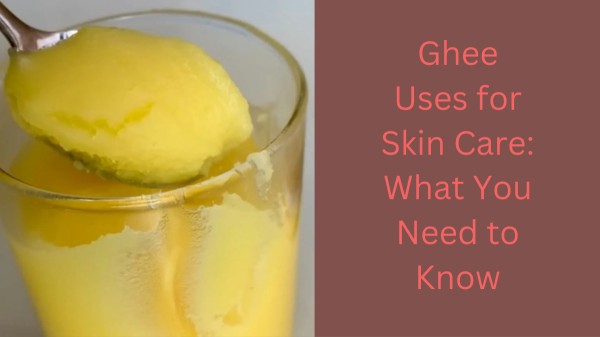Ghee has been discovered in India, used in cooking, ritual and healing for centuries. Despite limited research on the benefits of skin care, ghee is usually used to soften and hydrate the skin, provide a natural glow and treat various skin problems. This article ghee uses for skin and will know the specific ways to use ghee for skin care.
ghee uses for skin
Ghee, a type of butter. It has been used for centuries in cooking, ritual and healing. It is believed to have originated in India and is derived from the Sanskrit word ghrita.
Ghee is often used to help soften and hydrate the skin, impart a natural glow, treat dark spots, dry or damaged skin, protect against cold, dry, windy weather, treat chapped lips, reduce dark spots and rejuvenate the eyes. is
To use ghee on your skin, you can apply it directly on the skin and massage in circular motions. Here are some more specific ways to use ghee:
Face Mask: Mix ghee with turmeric and honey to make a face mask that will help brighten and moisturize your skin.
Moisturizer: Apply ghee to your skin after showering to lock in moisture and keep your skin soft and supple.
Spot Treatment: Apply ghee to dry, cracked, or irritated skin to soothe and heal the affected area.
Lip Balm: Apply ghee to keep your lips soft and hydrated.
Note that ghee is a highly concentrated form of butter and may not be suitable for everyone. If you have a dairy allergy or are lactose intolerant, it is best to avoid using ghee on your skin.
How to use ghee for skin whitening
To use ghee for skin lightening, you can mix equal amounts of ghee and turmeric to make a paste. Apply the mixture gently all over your face paying special attention to sensitive areas. Leave the mixture on your face to dry and after some time wash it off carefully with cold water. Dry your face with a cloth.
It is important to note that ghee is a highly concentrated form of butter and may not be suitable for everyone.
What are some other benefits of ghee
Ghee has been used for centuries in Indian culture for cooking, pickling and healing. Although there is limited research on the benefits of ghee, it is believed to have several health benefits. Here are some possible benefits of ghee:
Rich in vitamins: Ghee is a rich source of vitamins A, D, E and K, which are essential for maintaining healthy skin, bones and immunity.
Healthy Fats: Ghee contains healthy fats that help lower unhealthy cholesterol levels and support a healthy heart and cardiovascular system.
Anti-inflammatory properties: Ghee contains butyrate, a fatty acid known to have anti-inflammatory properties. Studies have shown that butyrate present in ghee can reduce inflammation within the body.
Weight loss: Ghee is a significant source of conjugated linoleic acid (CLA), which helps fight obesity. Research indicates that the CLA found in ghee can help reduce excess weight and reduce body fat in some people.
Digestive Health: Ghee is a natural source of butyric acid, which is known to improve digestive health by reducing inflammation and increasing healthy gut bacteria.
Brain health: Ghee is rich in omega-3 fatty acids, which are essential for brain health and cognitive function.
It is important to note that ghee is a highly concentrated form of butter and may not be suitable for everyone. If you have a dairy allergy or are lactose intolerant, it is best to avoid using ghee.
How much ghee should I consume
Ghee is a highly concentrated form of butter and should be consumed in moderation. You should consume 15 grams or 2 spoons of ghee daily.
It is important to note that the amount of ghee you should consume depends on your overall diet and lifestyle. If you have any health concerns or dietary restrictions, it is best to consult a health care professional before adding ghee to your diet.
